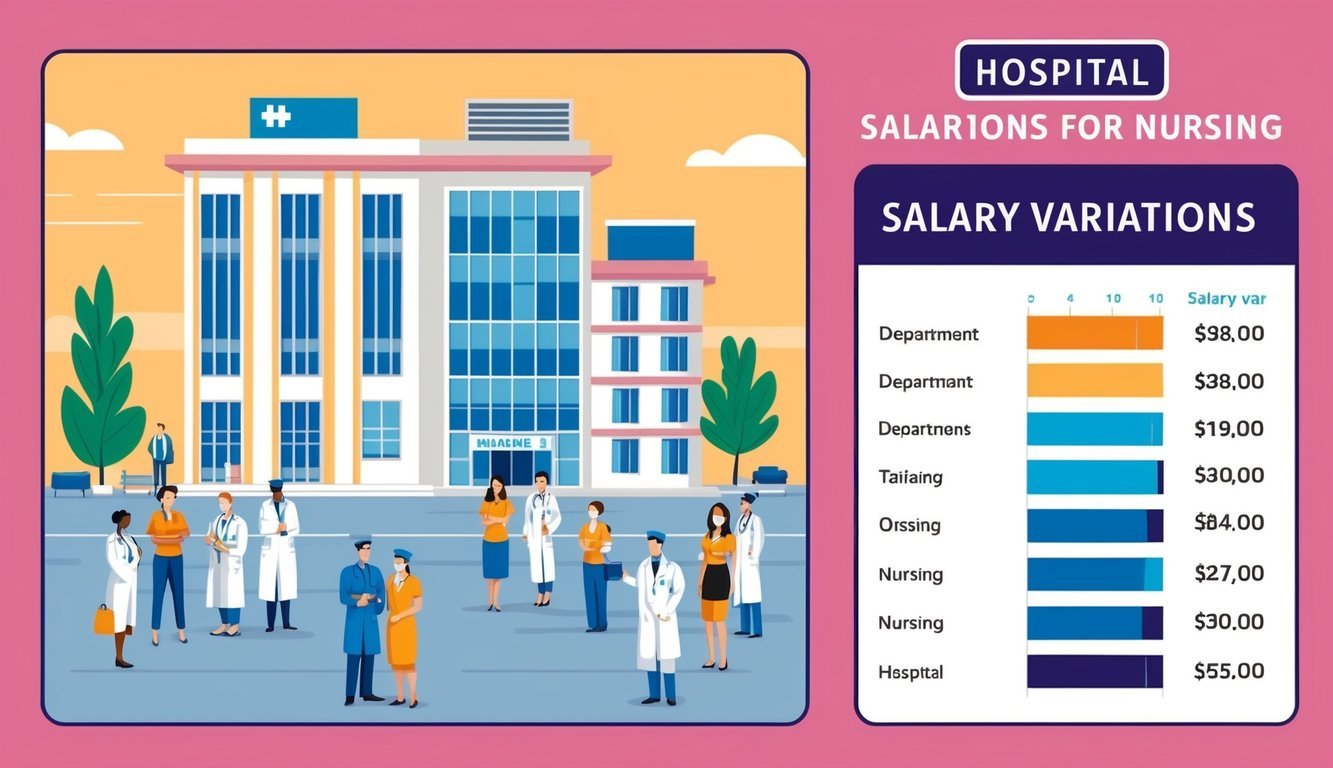The Associate Degree in Nursing (ADN) opens the door to a fulfilling career as a registered nurse (RN), offering numerous opportunities in the healthcare field. ADN nurses earn an average annual salary of around $77,000. This figure can vary based on factors like location, experience, and specialization.
As you embark on this rewarding nursing career, understanding potential earnings can be a key motivator in your educational journey.
You may be interested to learn that the ADN is often considered one of the quickest pathways to entering the nursing profession, allowing you to start gaining practical experience sooner.
According to multiple resources, the median salary for ADN-educated RNs aligns closely with the national average for registered nurses, which is approximately $86,070, as reported by the U.S. Bureau of Labor Statistics (BLS) and other industry experts.
This competitive salary reflects the high demand for nurses across various healthcare settings.
Exploring the ADN nursing salary in further detail reveals how your earnings can grow significantly with experience and continued education.
Factors such as your work environment and regional demand also play critical roles in shaping your financial outlook in this essential field.
For more detailed insights on salary variations and trends, visit resources like NursingProcess.org and Nurse.org.
Understanding ADN Nursing Salaries
ADN nursing salaries are influenced by various factors, including geographic location, level of experience, and the type of employer.
Awareness of these elements can help you optimize your earning potential in the nursing field.
Factors Influencing ADN Nurse Salary
Several key factors affect the salary of ADN nurses.
-
Experience: As with many professions, experience plays a crucial role. Entry-level ADN nurses may start with salaries around $70,000 per year, while those with several years in the field can earn over $90,000 annually.
-
Location: Geographic location influences salaries significantly. For instance, ADN nurses in states like Washington and California often earn higher wages due to the cost of living. Below is a table illustrating average salaries by state:
| State | Average ADN Salary |
|---|---|
| California | $98,000 |
| Texas | $78,500 |
| Florida | $73,000 |
| Washington | $91,000 |
- Employer Type: The type of healthcare facility also matters.
Hospitals generally pay more than outpatient clinics or nursing homes, partially due to the demand for RNs in acute care settings.
Comparing ADN and BSN Salaries
While ADN nurses earn competitive salaries, those with a Bachelor of Science in Nursing (BSN) may have the potential for higher earnings.
-
Average ADN Salary: Reports indicate that the average salary for ADN nurses is approximately $80,660 per year, or about $38.78 per hour.
-
BSN Salary: In contrast, BSN nurses often earn a median salary of $86,070 annually.
This difference highlights the financial incentive for pursuing a BSN.
Many employers also prefer or require a BSN for certain positions, which can impact job availability and salary potential.
Understanding these distinctions can help you make informed career decisions.
Exploring resources such as Nurse.org offers further insights into salary trends in the nursing profession.
Educational Path to an ADN

Pursuing an Associate Degree in Nursing (ADN) requires careful consideration of the educational programs available.
You will encounter various options designed to equip you with the necessary skills and knowledge to succeed in nursing.
Exploring ADN Programs
ADN programs typically span 18 to 24 months.
These programs focus on foundational nursing skills, critical thinking, and clinical practice.
Key components include:
- Prerequisites: You may need to complete courses in biology, chemistry, and psychology.
- Core Curriculum: The ADN curriculum often covers subjects like pharmacology, nursing fundamentals, and patient care techniques.
- Clinical Experience: Hands-on training in healthcare settings is crucial. You will participate in clinical rotations to apply your learning in real-world environments.
Accreditation is vital when choosing an ADN program.
Ensure it is accredited by recognized bodies like the Accreditation Commission for Education in Nursing (ACEN) or the Commission on Collegiate Nursing Education (CCNE).
This ensures your education meets established standards, which is crucial for eligibility to sit for the NCLEX-RN.
Online ADN Options
For those balancing work or family commitments, online ADN options provide flexibility.
These programs often combine online coursework with in-person clinical requirements.
Key features include:
- Asynchronous Learning: You can access course materials at your convenience, allowing you to learn at your own pace.
- Clinical Placement Support: Many online programs assist you in finding local clinical sites for hands-on experience.
- Technology-Enhanced Learning: Interactive simulations and online discussions can enrich your education experience.
Research various programs to find one that fits your needs.
Ensure they are accredited and meet the necessary criteria to prepare you for the NCLEX-RN.
Some institutions may also offer RN-to-BSN programs that allow you to continue your education after earning your ADN.
Career Outlook for ADN Graduates

As an ADN graduate, you may find a strong job market and numerous opportunities for advancement.
Understanding the trends in nursing job availability and the benefits of furthering your education can help you navigate your career path effectively.
Nursing Job Market Trends
The nursing job market is experiencing significant growth due to an ongoing nursing shortage.
According to projections, employment of registered nurses is expected to grow by 6% from 2023 to 2033, which is faster than the average for all occupations.
Many factors contribute to this shortage, including an aging population and increased healthcare needs.
Hospitals and healthcare facilities are actively seeking ADN graduates to fill nursing jobs and meet rising demand.
Key Trends:
- Increasing demand for nurses in various healthcare settings.
- Opportunities for ADN graduates in hospitals, clinics, and community health organizations.
- A favorable job outlook, with thousands of positions expected to be available.
Advancing from ADN to BSN
Moving from an ADN to a BSN can significantly enhance your career prospects.
Many employers now prefer or require nurses to hold a Bachelor of Science in Nursing.
This trend aligns with the American Association of Colleges of Nursing (AACN), which states that 70% of employers strongly prefer BSN graduates.
Participating in RN-to-BSN programs is an excellent way to achieve this advancement.
These programs typically offer flexible schedules and can often be completed online, making them accessible for working nurses.
Benefits of Advancing:
- Higher earning potential, with many BSN-prepared nurses earning up to $78,000 annually compared to their ADN counterparts.
- Increased job opportunities and the ability to take on leadership roles.
- Enhanced skills in critical thinking and clinical decision-making.
Consider the advancements available to you through an ADN-to-BSN program to better position yourself in the nursing field.
Specializations and Advancements

Exploring specializations and relevant certifications can significantly enhance your nursing career.
With the healthcare industry evolving, focusing on specific areas of expertise not only increases your knowledge but also your earning potential.
Certifications for ADN Nurses
Obtaining certifications is an effective way to stand out in the nursing field.
As an ADN nurse, you can pursue certifications in various specialties such as:
- Critical Care Nurse (CCRN): This certification demonstrates your expertise in caring for critically ill patients.
- Pediatric Nurse Certification (CPN): Aimed at nurses working with children, this certification showcases your ability to provide specialized care.
- Wound Care Certification (WCC): Focused on the assessment and treatment of wounds, this certification is critical for those in rehabilitation settings.
These certifications often require passing an exam and maintaining continuing education.
Investing in these credentials can lead to increased job opportunities and higher salaries in specialized roles.
Salary Impact of Specializations
Your salary as an ADN nurse can vary significantly based on your chosen specialization.
Here’s a quick overview of estimated average annual salaries for certified specialists:
| Specialization | Average Salary |
|---|---|
| Critical Care Nurse (CCRN) | $100,000 |
| Pediatric Nurse (CPN) | $88,000 |
| Wound Care Nurse (WCC) | $85,000 |
These figures can fluctuate based on location and experience.
Specializing can allow you to leverage your expertise into higher-paying positions, making it a strategic career move.
Work Environment and Salary Variations

Your work environment as an Associate Degree in Nursing (ADN) professional significantly influences your salary.
Variations arise depending on the type of healthcare facility and factors such as union membership.
Healthcare Settings and Salary Differences
Different healthcare settings offer varying salary scales for ADN nurses.
For instance, staff nurses in hospitals often earn more than those working in outpatient clinics or long-term care facilities.
The following table summarizes average salaries by healthcare setting:
| Healthcare Setting | Average Salary (Annual) |
|---|---|
| Hospital | $80,660 |
| Home Healthcare | $72,000 |
| Nursing Care Facilities | $65,000 |
| Outpatient Clinics | $70,000 |
If you specialize as an operating room nurse, your salary may be higher due to the specific skills required.
Travel nurses can also command higher hourly rates, sometimes exceeding $40 per hour, especially when working in high-demand areas.
Impact of Union Membership
Union membership can significantly affect your pay and benefits.
In facilities where nurses are unionized, pay scales are often negotiated, leading to higher salaries and improved working conditions.
Research indicates that unionized nurses can earn an average of $12,000 more per year than their non-union counterparts.
Additionally, union membership often provides better access to essential resources and support for patient care.
This support can lead to enhanced job satisfaction and retention in your nursing role.

